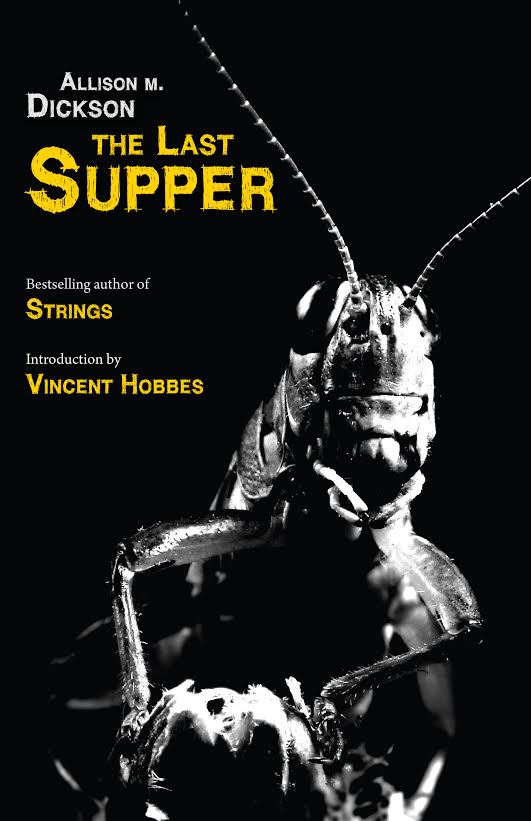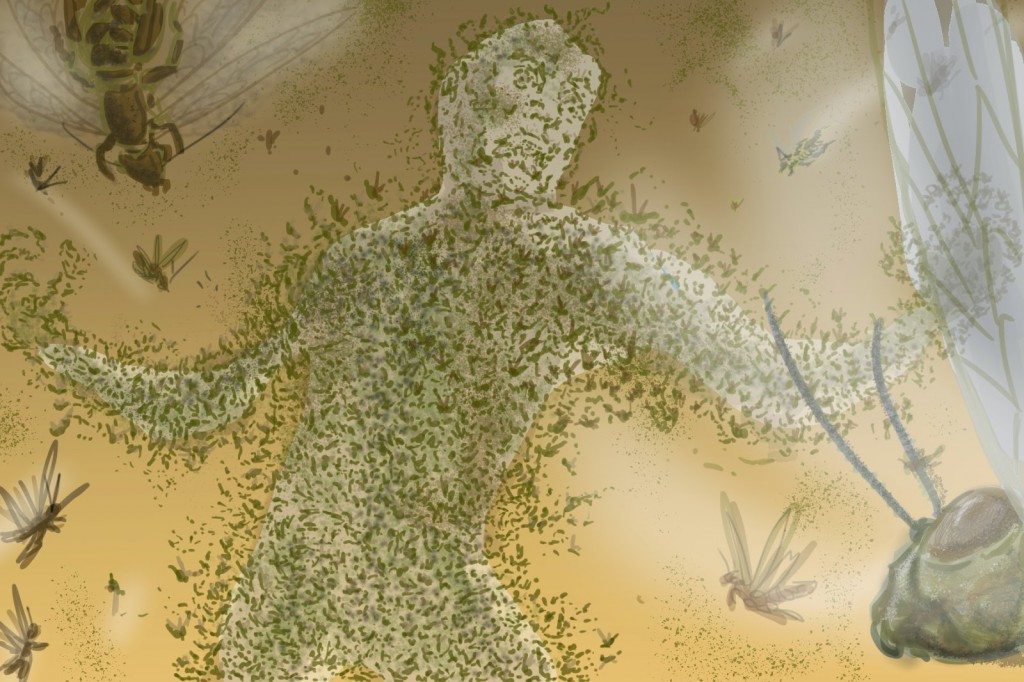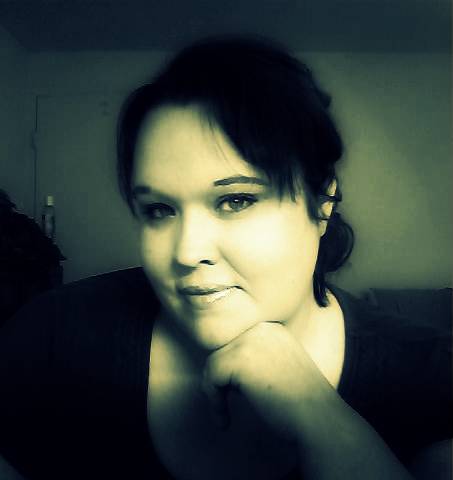Interview conducted by Gordon White
This Saturday, December 13, marks the release of Allison M. Dickson’s new novel The Last Supper (Hobbes End Publishing 2014). This dystopian sci-fi rebellion yarn has been building up significant buzz, including a starred-review on Publishers Weekly. In preparation for the release, Allison sat down with us to talk about the genesis of her apocalypse, her future plans for the desolate lands, and advice on how to make it as a hybrid* author in the modern market place.
*Hybrid of self-published and traditionally published author, not a mutant. Well, not necessarily a mutant.
Hellnotes: Let’s start with the basics – what kind of amuse bouche can you give us for The Last Supper? Whet our appetites!

HL: The blight of “serpent weeds” is very unique in terms of apocalyptic scenarios. Outside of M. Night Shyamalan’s cinematic masterpiece The Happening, I’m hard pressed to think of another plant-based end-of-days. What was your inspiration? Did the setting come early on in your conception of the story, or was it a later development?
AMD: Actually, the weeds didn’t come in until much later. My initial concept of the story was to keep the origins of the blight vague so I could focus more on the characters, but as I was developing the world more and more, I found it lacking a sense of color and texture, and I have a fascination with plants in general. They’re silent and passive, but they have a lot of power. My inspirations namely came from watching shows like Life After People, and seeing these crumbling facades swallowed up by ivy. As well as stories about really invasive plant species like scotch broom, kudzu, and giant hogweed, the latter of which can grow over fifteen feet tall and bleeds a sap that causes severe burns, blisters, and blindness. All of these plants were brought to places they shouldn’t have been, either intentionally or accidentally, and they wreak havoc and throw nature out of balance. That sort of thing really turns my imagination’s gears. Point of fact, I’ve written two other stories using plants as a theme. My short story, “Under the Scotch Broom,” and my novel Kudzu, which is currently with my agent and will hopefully find a home soon.
HL: In the world of The Last Supper (the Supperverse, as you’ve called it), humanity’s last refuge appears to be in protected cities, such as God’s Hope, where the story begins. Does The Last Supper take us beyond the city walls, into the new world? What kind of changes are out there?
AMD: Oh yes, there are protected towns sprinkled here and there. They live under domed nets to keep the pollen. John’s rebellion eventually forces him to escape, and this is when he can see the true havoc the weeds have wreaked upon the landscape as well as some of the other-worldly creatures that inhabit it.
HL: Recently, you found an 11,000-word proto-version of The Last Supper from 2008. How long has The Last Supper been marinating? What kind of conceptual changes did it go through to turn it into the novel that it is today?
AMD: That story originated from a dream I had—basically the whole opening scene with John eating his Supper—and I wrote those 11,000 words in one furious day-long writing session. It didn’t include anything about the weeds or the Divine Rite (they had a more generic name), or the Hand of God agents. It also didn’t feature a lot of the other large cast of characters the book does, like Genevieve and her father, or Ezekiel the Sentinel, or Anansi the Heretic. John was a lot more passive and didn’t really do much at all in the short story than just let himself be yanked around from place to place, dumbfounded at his bad luck. It was pretty bad, in other words. In the novel, he actively commits rebellious acts, and when he leaves, he takes his daughter, and the whole thing becomes a bit of a road story. Also, the short story was missing all of the mystical elements that the book has. There is a boy who can wield a life force called the Elan Vital (which is an actual French philosophical concept from the early 1900s), and John gets a lot of experience in that. I wrote the first 70,000 words or so of the novel and then walked away from it for a few years. I guess I felt like I’d exhausted myself with the concept, and that the story had grown bigger than me. And in many ways, given my level of experience at the time, that was true. But I came back to it in 2012, mostly out of a sense of morbid curiosity to see what my younger, inexperienced self had written, and I was shocked at how much life I felt teeming through those pages, and how prepared I felt to grab the bull by the horns. I finished the book over the course of a couple weeks and submitted it, and here we are.

AMD: Oh yes, there is so much more to this story and this universe that I can’t wait to share with people. I have a trilogy arc planned. The next one, titled The Book of Zehn, will begin early next year.
HL: You’ve been doing a lot of build up work over on your blog, including lots of multimedia content including videos and commissioned art. You’re also very open about your experience in publishing directly through Amazon and other platforms. What advice do you have for other authors on promoting themselves and being successful in publishing, either traditionally or through self-publishing?
AMD: My advice to new authors is, if you want to be successful, prepare to get your hands into everything. I’m a hybrid author, and honestly I think it’s the best way to take advantage of the plethora of options available to writers today. I published The Last Supper and my previous book, the horror thriller Strings, through Hobbes End Publishing, a great small press out of the Dallas area. They have been so good to me and they put out high quality products. They will almost certainly be publishing the sequels to those books. I recently acquired an agent (Stephanie Rostan of LGR Literary) this past summer for a dark suspense novel I completed back in May, because I would also like to see how my work might fare in the big leagues. I also occasionally publish short stories in magazines and publisher anthologies, but I release most of my short work and novellas myself through Amazon and other digital platforms, because it gives me a way to stay busy and keep my name out there while the slower gears of traditional publishing churn out my novels. I also love using it as a way to experiment with new genres and mashups. For instance, I have my Colt Coltrane series, which is a pulpy 1940s sci-fi noir/mystery thing I chose to independently produce rather than submit to publishers. It gave me the chance to work with a great artist friend of mine, Justin Wasson, as well as develop a local name for myself at various comic conventions in the area, which is the perfect audience for the Colt books. Those conventions also serve as venues to sell my other work too. Recently, I’ve been involving myself in a couple of author collectives—DeadPixel Publications and Westmarch Publishing. These ventures are a great way to promote and put together quality work with other authors offering their services (editing, formatting, cover art, promotion), advice, and camaraderie to one another in the group.
In other words, if you find yourself bored or without options in this business, you’re probably sheltering yourself too much from other markets and other authors. Don’t exclude any potential avenue to publication, be it Big 5 publishers, small indie or micro presses, cooperatives, or becoming a publisher yourself. People are getting way too dogmatic in this industry, and I think that’s bad for the market as a whole, as well as the readers.
HL: By this time, I’m sure you’ve been asked more than once what you would choose for your own “last supper,” so let’s change that. What would be your last breakfast?
AMD: You clearly know my heart. Breakfast is my favorite meal of the day, and there are few items from that category I won’t eat. But since it’s my LAST breakfast, here goes: Hashbrowns from Waffle House, smothered, covered, chunked, and diced; a bowl of grits with extra butter and two eggs over medium on top; a stack of blueberry pancakes with real syrup; a side of sausage links; a gallon of coffee black as my soul.
HL: Finally, other than dinner, what’s next on your plate?
AMD: The next really big thing is hopefully my agent finding a sale for my book Kudzu next year. But I am also releasing the next Colt Coltrane book (Colt Coltrane and the Stolen Sky) in March 2015, and I have a short contemporary fantasy story appearing in the January 2015 issue of Apex Magazine. John Dillinger, wizards, and magical speakeasies in Prohibition era Chicago. You can’t miss it!

Find Allison Online:
allisonmdickson.com
allisonmdicksonbooks.com
twitter.com/msallied
facebook.com/authorallisonmdickson









Trackbacks/Pingbacks